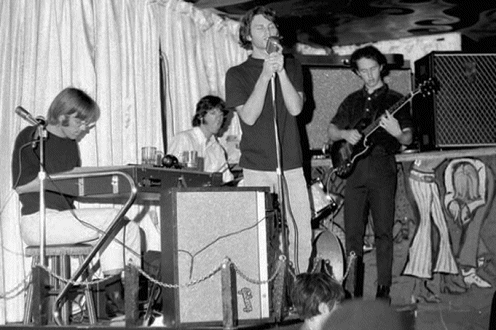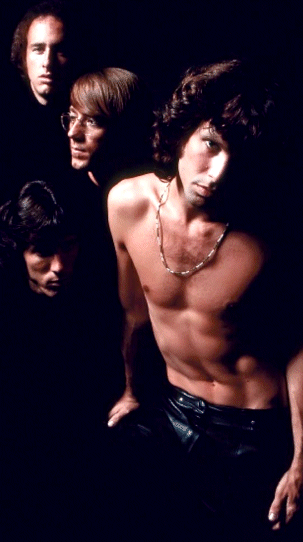Sixties
City presents
a wide-ranging series of
articles on all aspects of the Sixties, penned by the creator of the iconic
60s music paper Mersey
Beat
|
Sixties
City presents
a wide-ranging series of
articles on all aspects of the Sixties, penned by the creator of the iconic
60s music paper Mersey
Beat
|
|||||
|
 |
The Doors
were fronted by Jim Morrison, the son of a rear admiral, who was born on
8th December 1943 in Melbourne, Florida. The other members were Ray Manzarek
(keyboards, b. February 12th 1939 d. May 20th 2013), John Densmore (drums,
b. December 1st 1944) and Robby Krieger (bass, b. January 8th 1946). The
group was formed in 1965 and took their name from Aldous Huxley's book 'The
Doors of Perception'. That quote came from a line taken from William Blake:
"If the doors of perception were cleansed, man could see things as they
really are: infinite". This appealed to the charismatic Morrison who
believed that everyday experiences could and should be larger than the life
most people lead. They issued their debut album 'The Doors' on the Elektra
Records label in 1967 and it contained their huge single hit 'Light My Fire',
penned by Krieger. Two more LPs, 'Strange Days' and 'Waiting For The Sun', followed, along with another hit single 'Hello I Love You'. Dubbed 'The Lizard King', Morrison began to take the drug LSD and in 1969, at a concert in Miami, was accused by the police of lewd behaviour on stage, which resulted in the loss of $1million worth of bookings. In fact, he was arrested twice on stage. The first time was in New Haven when, during an instrumental break on 'Back Door Man', he met a girl backstage. He recalled, "And we started talking and we wanted some privacy. So we went into the shower room. We weren't doing anything, you know, just standing there and talking - and then this little man came up, this little man in a little blue suit and a little blue cap and he said, 'Whatcha doing here?' 'Nothin'.' But he didn't go away. He stood there and then reached around behind him and brought out this little can of something. It looked like shaving cream, and then he sprayed it into my eyes. I was blinded for about 30 minutes". When he went back on stage and started singing, the auditorium lights were turned off and he was arrested, taken to the police station and charged with giving an indecent and immoral exhibition. However, none of the charges were brought to bear. More and more police seemed to be turning up at Doors concerts. Krieger recalled, "It always bothered me to have police hanging around the concerts, waiting to bust us on any word or anything that we did - but we expected it. It was all part of the trip. There were two forces working, one force of change and the other force that wants things to stay the same and not be too far out, and there's always the balance that has to be present there at those situations".The second major occurrence took place at a concert in Miami when Jim had missed his L.A. connecting flight and arrived one hour after the concert had been due to start. He was completely drunk and began baiting the crowd and during the number 'Touch Me', it was said that he performed the infamous Miami flash, although Jim said that this didn't happen. Manzarek said, "Jim said to the audience, 'That's enough. You didn't come here to hear music, you didn't come here to see a good rock and roll band, you came here for something you've never seen before, something greater and bigger than you've ever experienced. What can I do? How about I show you my cock? Isn't that what you want? So he took his shirt off and put it in front of himself and started dancing around, holding his shirt down, covering his groin, and he pulled his shirt away. 'Did you see it, did you see it, there it is, look, I did it, I did it". |
| The Doors
then went for a short break in Jamaica, not expecting the furore the incident
caused. Bookings were cancelled, stations refused to give their records
airplay, Jim had been charged with indecent exposure, profanity, drunkenness
and lewd and lascivious behaviour and even the FBI put out a warrant for
his arrest for an unlawful flight to Jamaica. Morrison constantly turned
up late for concerts, either drunk or stoned and he seduced large numbers
of his young female fans. He had always believed that through drugs or alcohol
he could reach a higher state of being, an altered state of consciousness.
Before The Doors had even formed, when he was living in Venice Beach, he
was said to have taken 750 trips on LSD and had once smoked three ounces
of marijuana himself during a single night. His main habit was alcohol and
he would frequently leave a studio recording session to announce he was
nipping out to a liquor store and would return after having consumed a bottle
of vodka and a six pack. Ray Manzarek was to comment on the feeling he experienced after a concert: "My energy had been totally spent. I felt cleansed of all evil and darkness. We walked out of a concert feeling absolutely in touch with the universe and that, if any, was the message of Jim Morrison - 'Get in touch with yourself. When you do that, you'll be in touch with God, you become Gods'. Jim's message was that every man is a God - all you have to do is realise it". Manzarek was also to observe, "Jim Morrison was Dionysus, a Greek God incarnate. Apollo was the god of light, clear thought, logical thinking. Dionysus was the god of feeling, internal feeling, a god of spontaneity, the dance, the music. Dionysus enters the body through the ears, through music, through primitive rhythms. Jim was Dionysus personified. The man on stage was an absolute genius, a human theatricon. From one performance to the next you never knew what he was going to be. Sometimes a devil, sometimes a saint. Sometimes an angel, sometimes a demon from Hell, the Banshee himself. I've never seen a performer like him - it was as if a shaman was performing, not Jim". Doors drummer Densmore was to say, "A concert was total theatre - it wasn't planned or conceived in the studio, it was fairly subconscious. Jim was magical - he never knew what he was going to do each night, and that's what made it so exciting - the suspense, because obviously we didn't know either. Plus he had a great rapport with the audience. He could really work them up!" Two further albums, 'Morrison Hotel/Hard Rock Café' and 'L.A.Woman', were released. Morrison, who was widely read, had always been interested in poetry and the lyrics to his songs strove to be a medium for people to achieve a truer and higher state of awareness. This was most apparent in his autobiographical poetry recording 'An American Prayer', which was set to music by the remaining Doors members. He recorded it on his 27th birthday and one student observer commented: "He was using words not so much for their logic as for their emotive effect. The words didn't have to mean so much as imply or suggest. He used words to create a vast mural of feeling. I felt like a swimmer in a heavy sea - it was alright as long as I let the swell of words carry me along, but if I tried to fathom the meaning or understanding, I was quickly under water". On 'An American Prayer,' Morrison explains: "Me and my mother, father, grandmother and grandfather were driving through the desert at dawn and there was a truckload of Indian workers and either hit another car or, I don't know what happened, but there were dead Indians scattered all over the highway, bleeding to death. So the car pulls over and stops. That was the first time I ever tasted fear. I must have been about four. Like a child is like a flower. Its head just floating in the breeze, man. The reaction I get thinking about it now, looking back, is that the souls of the ghosts of those dead Indians - maybe just one or two of them - were just running around, freaking out, and just leaping into my soul…and they're still there". Late in 1970, Morrison and his wife went to live in Paris, where he professed an intention to write poetry. The band continued without him and issued 'Love Her Madly', a U.S. Top 20 entry. Morrison died from a heart attack in his bath on 3rd July 1971. The Doors continued with their career and charted that year with 'Riders on the Storm'. They issued two further albums, 'Other Voices' and 'Full Circle', but disbanded in 1973. Manzarek was unsuccessful in his attempts to re-form the band and issued solo albums such as 'The Golden Scarab' and 'The Whole Thing Started With Rock 'n' Roll'. Initially, Krieger and Densmore became record producers, then teamed up in the Butts Band. Krieger turned to jazz and issued an album 'Bobby Krieger And Friends' in 1977. 'Riders on the Storm' entered the UK chart for a second time in 1976. A film biopic, 'The Doors' directed by Oliver Stone was released in 1991 and spawned a soundtrack album, also leading to the release of a 'Greatest Hits' CD that year. The surviving Doors - still California residents - were inducted into the Rock & Roll Hall of Fame in 1993. Four years later, they collaborated on a well-received boxed set containing a majority of previously unreleased material. Called simply 'Doors' the 4 CD boxed set was issued in October 1997. Ray Manzarek has penned several books, apart from his autobiography, 'Light My Fire - My Life With The Doors', he has written some novels, including 'The Poet in Exile' about Jim Morrison and 'Snake Moon', a Civil War ghost story. John Densmore has also penned his autobiography, 'Riders On The Storm' and currently tours with his group 'Tribaljazz'. Robby Krieger has recorded several solo albums and in 2006 was touring with Ray Manzarek and Ian Asbury in a band called 'Riders On The Storm'. |
 |
|
Article
Text
|